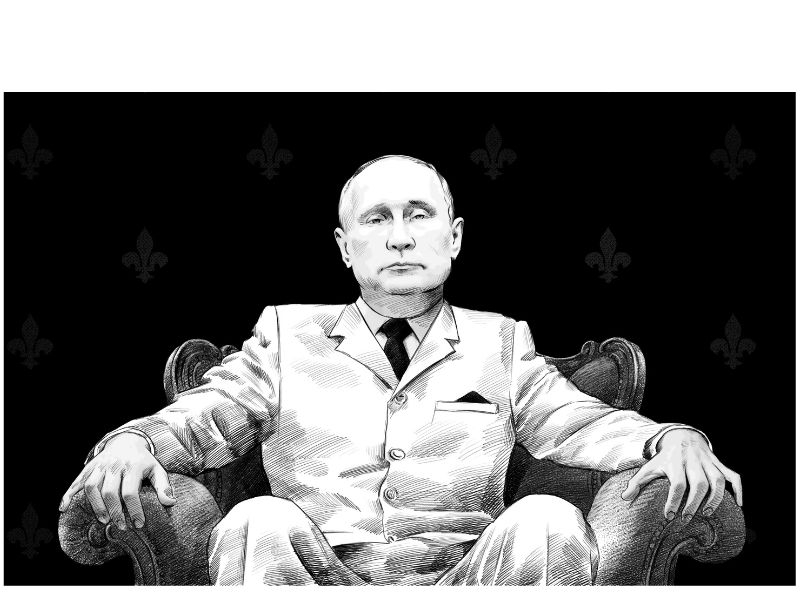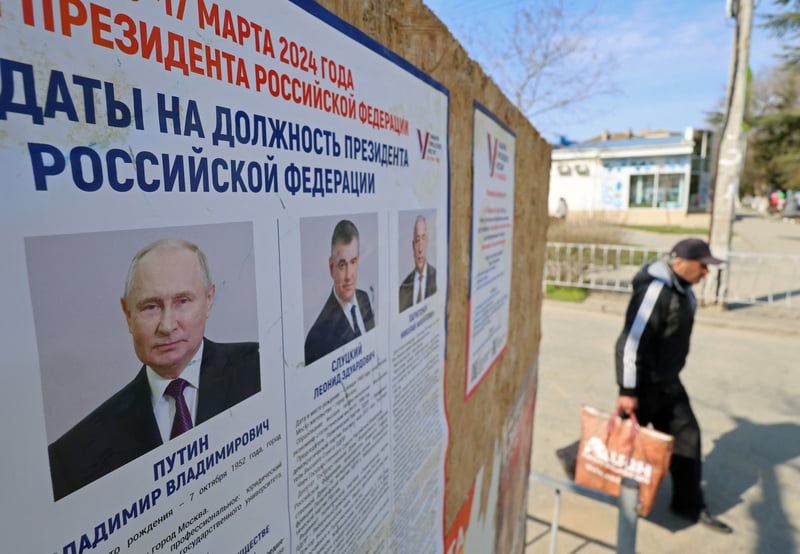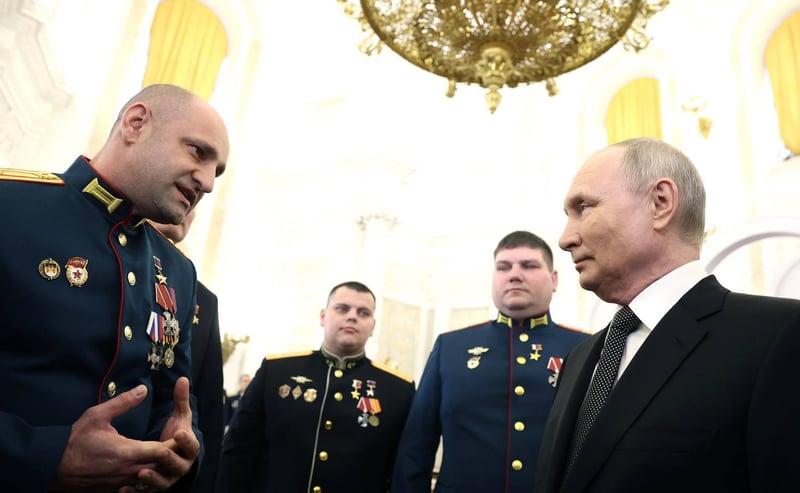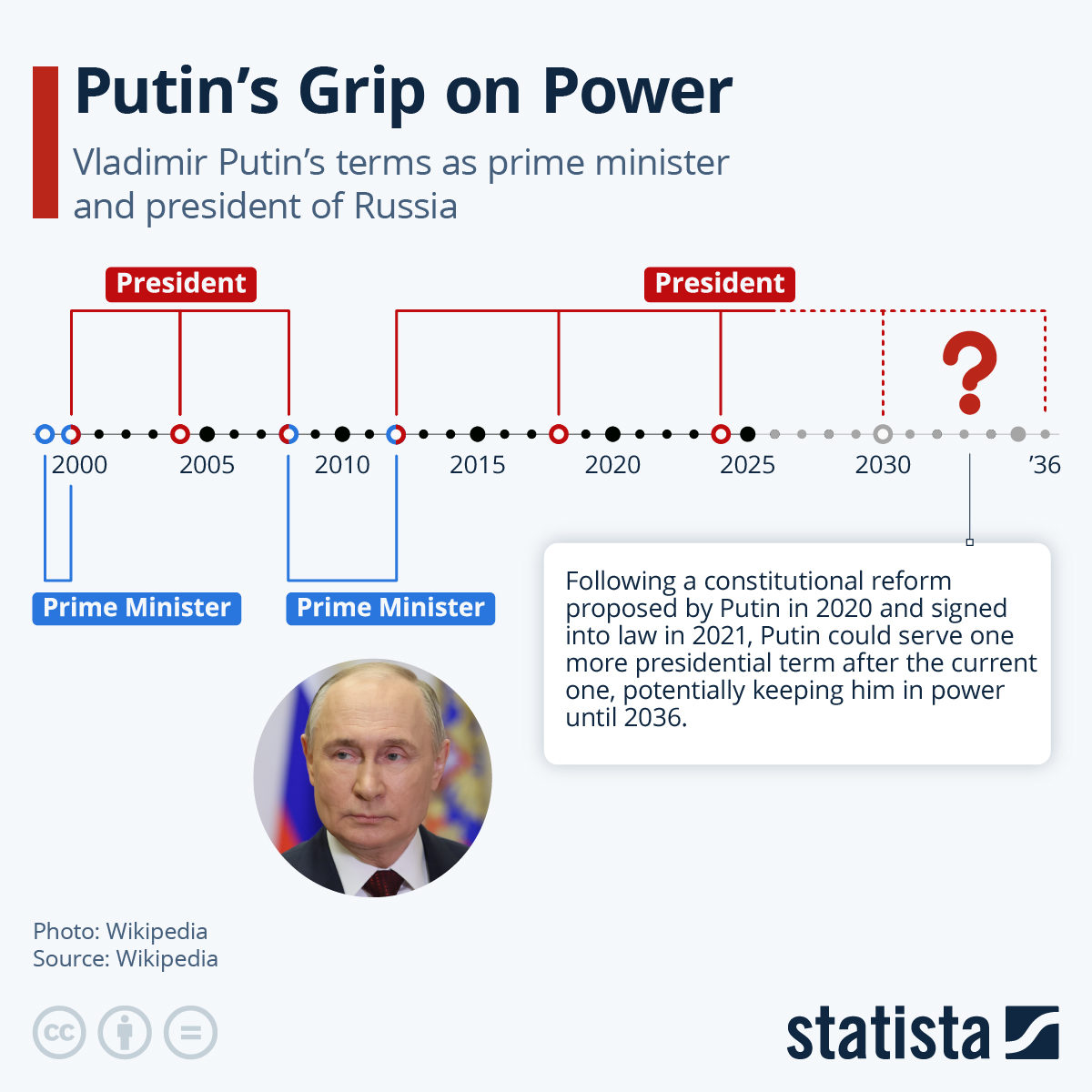By: emmi kivi
iryna hnatiuk
March 13 2024
'The totalitarian democracy': Mockery of the Russian presidential election

Source: Shutterstock/TPYXA_ILLUSTRATION
Vladimir Putin has essentially ruled Russia for the entirety of the 21st century, serving twice as Prime Minister and four terms as the President by rewriting the rules and laws of Russia’s political system to extend and expand his powers.
After holding the reins for eight years, the presidential term was lengthened from four to six years in 2008. Due to constitutional limitations, Putin stepped back to rule as Prime Minister while Dmitri Medvedev served as "a straw man" president waiting for Putin’s re-election in 2012. The 2020 constitutional changes reset the two-term presidential limit to zero, allowing Putin to potentially be president-select for two more consecutive six-year terms, until 2036.
On December 8, Putin announced he would run for the presidency of the Russian Federation in the election held March 15–17, including in the occupied territories of Ukraine – Donetsk, Luhansk, Kherson, and Zaporizhzhia.
(Source: Statista)
Few would be surprised by Putin’s decision to run for a fifth term or by his victory. Indeed, support for Putin appears to be soaring. Steadily increasing since September, in February 2024, 86 percent of Russians approved Putin's activities as president, according to the Russian Levada Center.
The ruling president has little to worry about the election results with the reins over state media and the absence of political opposition. In a report on the current political and information climate in Russia, Freedom House says that "power in Russia’s authoritarian political system is concentrated in the hands of President Vladimir Putin. With loyalist security forces, a subservient judiciary, a controlled media environment, and a legislature consisting of a ruling party and pliable opposition factions, the Kremlin manipulates elections and suppresses genuine dissent."
The vast majority of opposition figures are either imprisoned or in exile, almost all independent news outlets have been banned or blocked, and criticism has been muted by repressive laws adopted over the last decades, a trend that has only escalated since the full-scale invasion of Ukraine in February 2022.
Although later backtracking on the comment, in August 2023, Kremlin spokesman Dmitry Peskov told the New York Times called the election a "costly bureaucracy" instead of a democratic process. Despite the orchestrated result, there is nevertheless the errand of holding the election, but simultaneously, political strategists in the Kremlin have clear goals for the 2024 presidential election: record-breaking high turnout for President Putin’s reelection.
However, interest in the upcoming election is low. According to the pro-government FOM polls in February, the presidential campaign had attracted the interest of just one percent of Russian citizens. Over 110 million are eligible to vote in an election that is far from genuine, free, or fair, where the outcome is predetermined before a single ballot is cast.
Logically Facts conversed with experts to explain why Russia continues to organize elections. What purpose do elections serve for the Kremlin and its disinformation campaigns?
Securing victory through probated authoritarianism: Crackdown on the media, dissent, and voter rights
Regarding the 2018 presidential election, the OSCE Office for Democratic Institutions and Human Rights (ODIHR) stated that the election "took place in an overly controlled legal and political environment marked by continued pressure on critical voices" and "restrictions on the fundamental freedoms of assembly, association and expression, as well as on candidate registration, have limited the space for political engagement and resulted in a lack of genuine competition."
Even in fraudulent elections, voters take center stage to showcase regime support. In the 2018 presidential election, the reported voter turnout was 67.5 percent, but international observers reported multiple election violations, including ballot-box stuffing and forced voting. The OSCE has not taken part in Russian elections since the 2018 election, but similar trends and tactics of election manipulation were also reported during the 2020 election on constitutional changes, the 2021 parliamentary and 2023 regional elections.
Before the 2024 March election, electronic voting and QR codes were also harnessed to control voter turnout. The government has mobilized party members and state and local business employees to bring voters to the polling station. Also, Russian election monitoring group, Golos, already reported on multiple violations in signature collection, coercion and bribery of voters in multiple regions.
Attempts to increase voter turnout in Russian elections lack substance because there are no alternative ideas or proposals for the country’s development, and apathy towards politics, especially in Moscow, has been shared during Putin’s leadership. "People have no doubt that the president will win, which negatively affects turnout: why go anywhere if the result is predetermined? But it [turnout] needs to be high. For that, there must be at least some interest for them [elections]," a source close to the Russian President’s Administration told Meduza, a Russian independent news website headquartered in Riga, Latvia.
Election manipulation is firmly linked to a tight control of the information sphere. In Russia, the 2020 constitutional amendments limited the freedom of speech and heavily censored the media and internet. "Media gradually came under the control of major oligarchs cooperating with the authorities. They easily "surrendered" freedom of speech," Meduza’s political observer, Andrey Pertsev, explained to Logically Facts about the changes in the Russian media environment.
With a tight grip on the flow of information, the media ecosystem is equipped to push for Kremlin-desired narratives and disinformation. Estonian news website Delfi, alongside other international media outlets, obtained internal documents from the Kremlin revealing a €1 billion budget for a synchronized effort for Putin’s campaign to influence public opinion, secure reelection, and promote loyalty towards President Putin.
The so-called "Kremlin leaks" revealed a government-controlled network of non-profit organisations with money allocated for television, cinema, games and online content, with material also expanding to the occupied territories in Ukraine. Money was allocated to Institute for Internet Development (IID) which prepared creative content ahead of the presidential election. These included multiple film projects, broadcasts and music festivals. These included a series "GDR" displaying the daily life of intelligence officers in East Germany fighting against Western influence. The protagonist hints to Putin, a former KGB-agent himself, France24 reported.
Also, several films, series and other projects were advised to humiliate the West and Ukraine’s president Zelenskyy, by, for example, portraying him as a puppet of the "Anglo-Americans."
The documents also uncovered the financing of a special internet blocking system in relation to the presidential election and the occupied Ukrainian territories to control the information space. The silencing of dissent has only escalated since the full-scale invasion of Ukraine in February 2022, with the aim to stop Russian people from criticizing the government’s policies and to squash protests against the war. These included amendments that tightened the "fake news" laws, which criminalized the purposely spreading of so-called false information about Russian state bodies, giving space for Putin to disseminate narratives without opposition
Cast a ballot for Putin: Election mimicry for regime legitimacy and personal popularity
Volodymyr Fesenko, the chairman of the board of the Center for Applied Political Studies (Penta), explained to Logically Facts, "Different dictatorships often mimic electoral procedures (elections and referendums) to formally legitimise their power. However, they avoid real competition in elections or strictly limit and control it. There is no real competition in these elections; the winner is known in advance. Therefore, these are not real elections but their imitation and simulation."
 (Source: Reuters)
(Source: Reuters)
The Russian Central Election Commission (CEC) announced the competing candidates for the upcoming election in early February. While Putin is running as an independent candidate, the competition consists of Kremlin loyalists Leonid Slutsky of the Liberal Democratic Party of Russia (LDPR), Vladislav Davankov (New People), Nikolay Kharitonov (Communist Party of the Russian Federation). The selected candidates support Kremlin policies, including the Russian invasion of Ukraine.
Under Putin’s decree, Russia’s Central Election Commission (CEC) barred anti-war candidates Yekaterina Duntsova and Boris Nadezhdin from running due to "flawed applications" during candidacy registration.
Two other main explanations have emerged for Putin to organize the vote: to simulate the legitimation of power and manifest popularity. "For good or for bad, elections are the only source and mechanism of legitimation in Russia and many other non-democratic countries. Rulers of these countries maintain their electoral support as a protection shield against potential coups, as their non-elected contenders are not legitimate. This is why elections are conducted regardless of their outcomes," Professor of Russian politics Vladimir Gel’man at the Finnish Centre for Russian, Eurasian and Eastern European Studies (Aleksanteri Institute) told Logically Facts.
According to a RUSI analysis, the hand-picked opposition aims to reinforce Putin’s narrative that only he is a capable candidate for the job and to weaken any genuine threats to his authority. Putin’s "electorate management" strategy portrayed him as the defender and reformer of Russia, but there are no alternatives to Putin’s leadership.
"These are not very noticeable 'elections' in terms of the campaign. Putin does not say anything new, nor do the other candidates", Pretsev told Logically Facts. Ahead of the election, Putin decided not to participate in electoral debates but made his state-of-the-nation address on February 29. In his two-hour speech, without directly speaking of the election, Putin discussed Russian economic successes and social reforms, portrayed a positive view of the frontlines in Ukraine, and re-shared false claims of "denazification" of Ukraine to legitimize the full-scale invasion of Ukraine.
The Kremlin aims to show that it is ready and able to facilitate an election reflecting its strength even during a war, not only to the domestic audience. Putin has propagated well-known disinformation on "the Western threat," painting an image of the Kremlin to be the conciliatory side against Western and NATO provocation in Ukraine.
In his state-of-the-nation address, Putin proclaimed that "Russia’s political system is one of the pillars of the country’s sovereignty... We will not allow anyone to interfere in our internal affairs." Simultaneously, the Russian media aimed to represent the Russian election and Putin’s candidacy as the "victory of democracy" during times of war and call past Western elections rigged, such as the 2016 U.S. election.
Now, according to Ukrainian Intelligence, Russia is preparing a disinformation campaign called Maidan-3, aiming to demoralise Ukrainians, sow panic among the population, and lower trust in the country's political leadership, as this is the deadline for Volodymyr Zelenskyy's term as president. They added that Russia wants to play on the fact that the Ukrainian leader no longer has the authority, as his presidency has expired. However, the president's term cannot end without elections, which are impossible during wartime.
Also, Russian Foreign Ministry Spokesperson Maria Zakharova stated that "Russia will firmly suppress any Western attempts to interfere in the upcoming presidential election." During a briefing on March 13, she stated that Russia recorded direct attempts by the West to influence the situation in the country ahead of the upcoming presidential elections. False claims of NATO provocateurs being hired to orchestrate illegal activity during the campaign were circulating online.
"On the international level, the Russian authorities want to show that the majority of citizens support Putin, meaning support for the war, and the president is becoming increasingly popular," Pertsev disclosed to Logically Facts.
Voter control over coercion: Sham elections in the occupied Ukrainian territories
Vladimir Putin announced his candidacy for the election at a televised ceremonial event, during which he awarded the nation’s highest medal, the Hero of Russia, to multiple veterans of the invasion of Ukraine.
Some experts concurred that Putin’s decision to announce the candidacy during a military award ceremony indicates a will to connect the war to Putin’s election campaign. Russian election authorities chose the pro-war symbol "V" in the colors of the Russian flag as the official logo and Putin’s slogan "Together we are strong — vote for Russia!" of the 2024 presidential vote.
 President Putin with Lieutenant Colonel Artyom Zhoga (left), the Russia-installed Chairman of the People’s Council of Donetsk People’s Republic. (Source: YouTube/Screenshot/Edited by Logically Facts)
President Putin with Lieutenant Colonel Artyom Zhoga (left), the Russia-installed Chairman of the People’s Council of Donetsk People’s Republic. (Source: YouTube/Screenshot/Edited by Logically Facts)
Abbas Gallyamov, a political analyst and former Putin speechwriter, described the event to AP News as "multiple choice is replaced with a simple, dichotomic one: ‘Are you for or against Putin?’" and has said that it will be a "referendum on the issue of the war, and a vote for Putin will become a vote for the war."
Russian election rigging is not only limited to the Russian territory, but also in the occupied territories of Ukraine. The Main Intelligence Directorate of the Ministry of Defense of Ukraine reported: "to create a fake image of "support" for the Russian dictator, the occupiers dispatched specially prepared units to the occupied territories to oversee the falsifications and monitor the work of the so-called "electoral commissions". These so-called elections in occupied territories have been legally null and void by both Ukrainian and international authorities.
In the occupied Zaporizhzhia region and Kherson region, the Russia-controlled administration began conducting early voting in late February, followed by the Donetsk and Luhansk regions. A deputy of the Kherson Regional Council, Serhiy Khlan, reported how, due to the lack of people willing to "vote," the occupying authorities initiated house-to-house visits under the name of "presidential elections" in Russia but also "caught people on the street without caring if the person had a passport,". He added that there were no voters’ lists.
Map of Ukraine showing the Russian occupied territories (in orange) in which presidential election are organized. (Source: Shutterstock)
This is not the first time Russia has organized elections in occupied territories of Ukraine. 2022 referendums took place in Donetsk, Luhansk, Kherson, and Zaporizhzhia to determine if they should join Russia. In 2014, Russia faked a referendum in Crimea to legitimize its illegal annexation. Although official results claimed overwhelming support for joining Russia, neither Ukraine nor the international community recognized the election for the lack of adherence to standards for free and fair elections and due to the violation of the territorial integrity of Ukraine.
Measures of election management are amplified by messaging focused on legitimizing the election in March. EUvsDisinfo, a European Union project that tackles mis- and disinformation, refuted re-shared false claims of election legitimacy in the occupied territories and the democratic process of past void elections in the territories. These rigged elections are intended to fuel Russian disinformation aimed at legitimizing the invasion of Ukraine, the illegal annexation of Ukraine’s territories, and to indicate the legitimacy, ability and support for Russia to organize the presidential election in Ukrainian territories.
The Russian presidential election in March 2024 will not be a genuine competition between political alternatives but a demonstration of Vladimir Putin’s hegemony. The election will not be genuine, free, or fair in Russia, nor the occupied territories of Ukraine. But even Putin’s authoritarian leadership requires legitimacy and popular support, which is established through rigged periodical elections. "The main narrative, both domestic and international: Putin is equal to Russia, and he can do whatever he wants without any limits," Professor Gel’man told Logically Facts.



